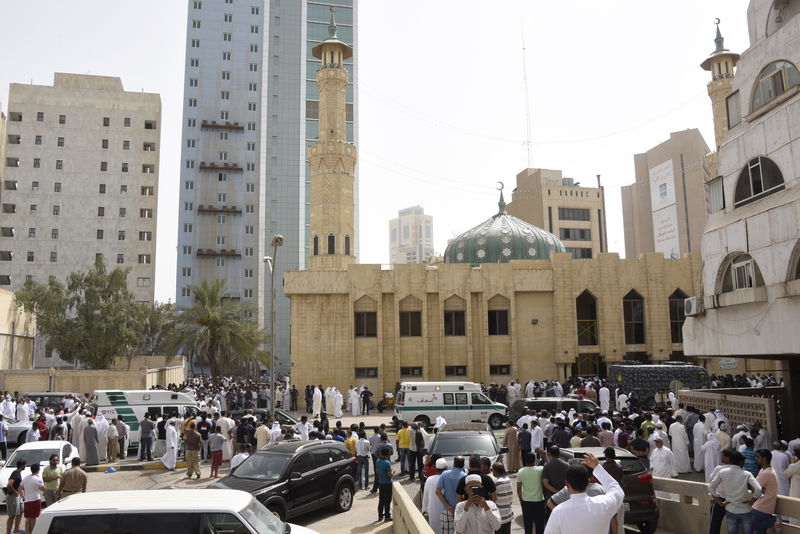By Sami Aboudi and Taghreed Almadani
DUBAI (Reuters) - It may have been a prank, albeit a malevolent one, or a genuine threat of violence, when flyers featuring the Islamic State flag were placed near a Shi'ite Muslim mosque in Bahrain this week.
But whatever the motive, the unsettling discovery at Ain al-Dar al-Shamali mosque was an additional test of mettle for a community already on edge following three bombings of Shi'ite mosques by the militant group in Saudi Arabia and Kuwait since May 22.
With the ultra-hardline Sunni group, which regards Shi'ites as heretics, choosing to strike at Friday prayers, nerves are stretched tight across the region on the eve of another Friday.
The Shi'ite community - a minority in most Gulf Arab states but the majority in Bahrain and some eastern parts of Saudi Arabia - has worked hard, often with local security forces, to step up security and calm communal relations.
Reflecting the sensitivity, Bahraini Justice Minister Sheikh Khaled bin Ali al Khalifa warned of legal action "against anybody implicated in the incitement of hatred or sedition".
In Kuwait and in Bahrain, Sunnis and Shi'ites will pray together in main mosques, as a sign of national unity and in a challenge to the militant group, which is expanding, notably in Egypt, Libya and Yemen, from its strongholds in Iraq and Syria.
Feelings among Shi'ites across the energy-rich Gulf region are raw after the deaths of more than 50 people in attacks intended to stir sectarian hatred.
"Is there worry? Yes there is," said Waleed Sulais, a Shi'ite Saudi researcher who lives in the eastern part of the kingdom. "But that did not weaken people's spirits, and you see more people at the mosques," he told Reuters by telephone.
MILITANTS "SPREAD FEAR"
"They (ISIS) have managed to spread fear. Mothers are now afraid of sending their boys to pray at mosques," Amal, a 34-year-old teacher in Oman, said after police inspected a suspicious bag found near a Shi'ite mosque in Muscat.
"We are concerned after what happened in Kuwait. Not from locals, we know that we live in harmony, but from visitors," she aid, referring to the Saudi nationality of the June 26 Kuwait attacker, who killed 27 people including himself.
Residents in Saudi Arabia, Bahrain, Kuwait and Oman said authorities had deployed extra police patrols outside Shi'ite mosques and installed security cameras in some.
Sulais said authorities had placed concrete blocks around some mosques in eastern Saudi Arabia while local volunteers frisk worshippers or scan them with metal detectors for explosives before they enter.
Kawther al-Arbash, whose son died in the Saudi city of Dammam on May 29 while preventing a suicide bomber from entering a mosque, said that more volunteers have been working to ensure safety of a larger number of people attending prayers, especially during the holy month of Ramadan.
"I am worried that those terrorists might attack unexpected places, like mosques in rural villages," she told Reuters. "My cousin texts me every day before he goes to the mosque, saying: 'I'm going to the mosque now and I might not come back'."
"SECURITY VOLUNTEERS"
In Kuwait, parliament member Yousef al-Zalzala told Reuters measures taken since June 26 sought not only to find those behind the attack there but also to "take precautions and make sure these precautions are good enough to deter terrorists."
However one Shi'ite resident told Reuters he would not go to mosque on Friday, because after the June 26 attack he had no confidence in the ability of the state to protect civilians.
Residents reported a string of security steps in Kuwait and in Bahrain, where an unverified Twitter (NYSE:TWTR) message by a prominent Islamic State militant, Turki al-Binali, suggested the island kingdom would be the destination of the next suicide bomber.
Bahrain had recruited "security volunteers" to coordinate entry of worshippers into mosques and to prevent crowds from gathering and obstructing movement in case of any incidents, state news agency BNA reported on Wednesday.
Shi'ites in the United Arab Emirates said authorities had assured them that steps had been taken to ensure security.
"Obviously, when you see the reports of these threats on the news wires, social media and WhatsApp you would fear the worst, even if there's a one per cent chance," said Muneer al-Arahma, general manager of the Jaafari Islamic endowment in Dubai.

"But, thank God, the authorities have reassured us that security is under control and there's nothing to worry about."
(Additinal reporting by Fatma al-Arimi in Muscat and Hadeel al-Sayegh in Dubai; Writing by Sami Aboudi; Editing by Peter Graff)